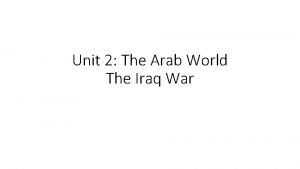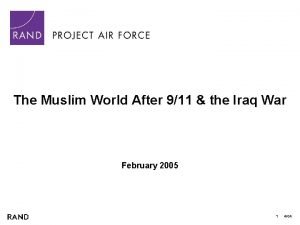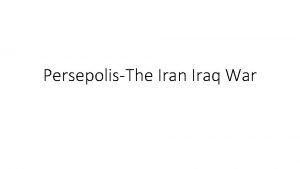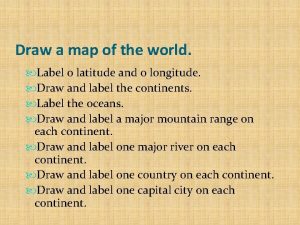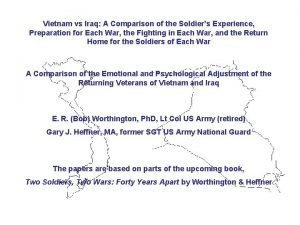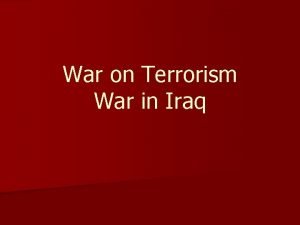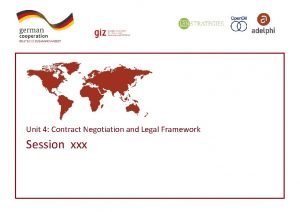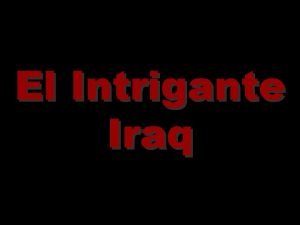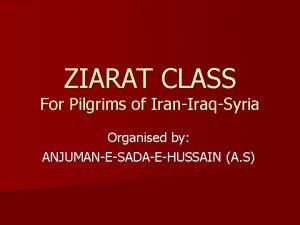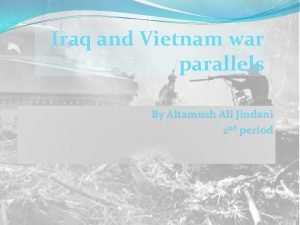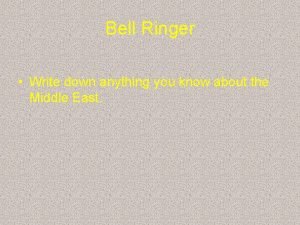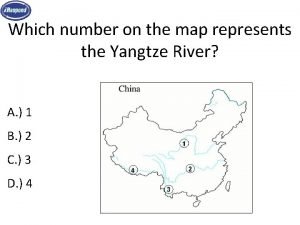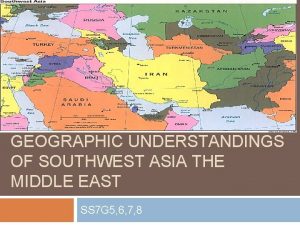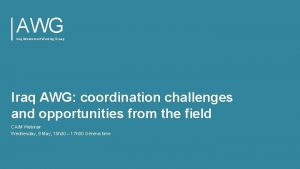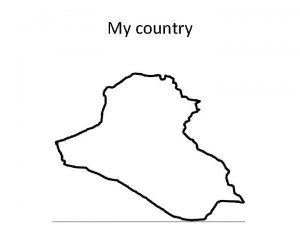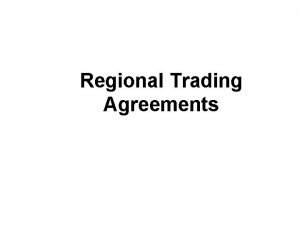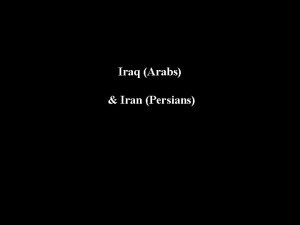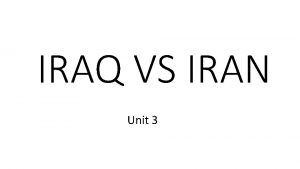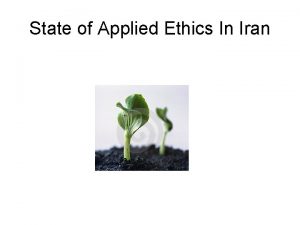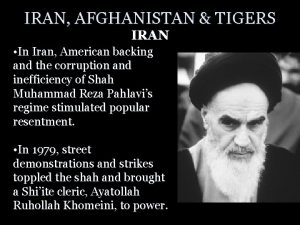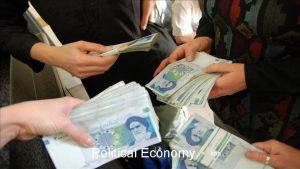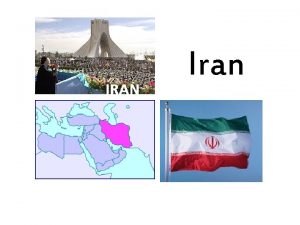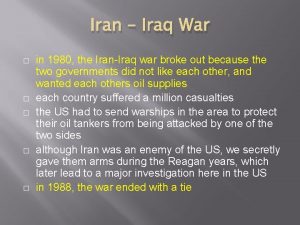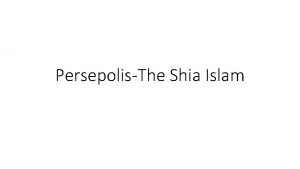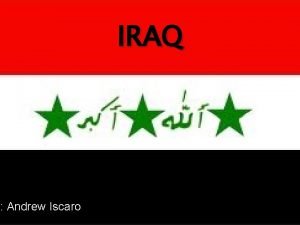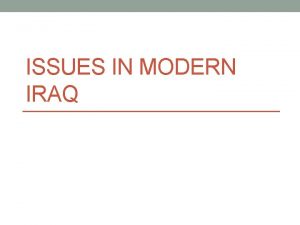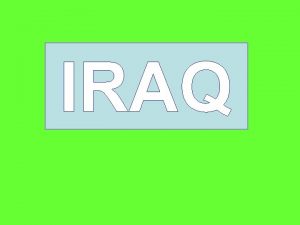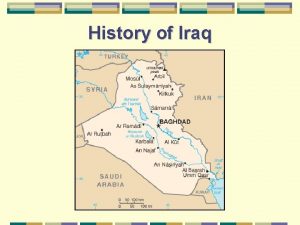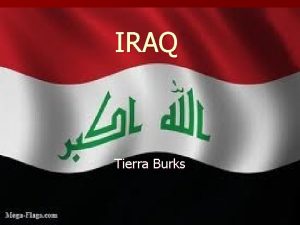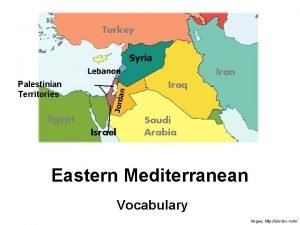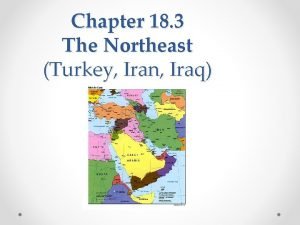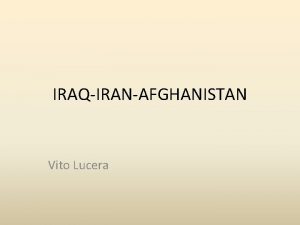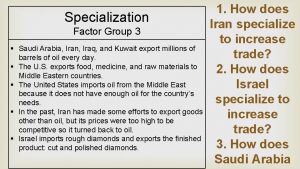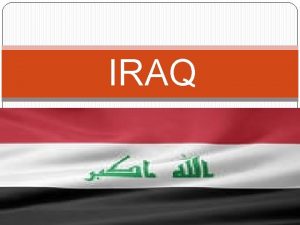PersepolisThe Iran Iraq War What was the war
























- Slides: 24

Persepolis-The Iran Iraq War

What was the war about? • Sunni vs Shia—Saddam Hussein claimed that this war was started because of Ayatollah Khomeini’s instigation of Shia revolutions within Iraq and the Golf States. • Oil Money– the main region being contested was oil and trade port rich Khuzestan. • Authoritarian Regimes—The international community was concerned that the authoritarian regimes of Iraq and Iran would hinder the flow of oil out of the middle east. • The loss of independence of Iran—With Soviet Russia in Afghanistan and American backed Sunni states on either side, Iran felt threatened especially the new Fundamentalist Government.




The Fate of Revolutions • To Expand thereby solidify your regime as the new country. Showing all others that fighting or trying to break you will not work. • To be toppled by a power that suffers or wants gain from your revolution while it is still weak. • To stagnate in revolution is not allowed.


The Conflict Begins • 22 nd of September 1980, Saddam declares outright war expecting that the Revolution in Iran will have weakened the country to the point of non resistance. • Iran was weak. The Ayatollah Khomeini had dissolved or imprisoned the majority of the professional army in order to keep them from rising against the newly founded government. • As well, after seizing the American Embassy in Tehran the Iranian government had isolated itself from the rest international community.


1982 when it could have stopped • By 1982, Saddam Hussein’s offensive had halted due to fierce resistance and it soon became clear he had spread his troops too thin. • By this time the Iranian forces had retaken most the most important cities, including Khorramshahr. After this the Iraqi army voluntarily withdrew. • Iraq began seeking peace having failed to destabilize the Iranian government. • But, Ayatollah Khomeini having a personal hatred for Saddam Hussein and wanting to press the current streak of victories decided to push forward.


The Martyrs • Both the Iraqi and Iranian armies were mostly formed of conscripts, in both countries military service was mandatory. • Part of these conscripts were the Basij of Iran, known to us as the Revolutionary Guard, as opposed to the Republican Guard of Iraq. • These Basij were the under-aged conscripts given keys and sent to run out in front of the regular troops. This was how Iran decided to use its superior man power. • Forgiven for their trespasses these soldiers thought they were fighting for God.



Foreign powers • Iraq got backing from Saudi Arabia, Jordan, Kuwait, the United States, the Soviet Union, and the United Arab Emirates in the form of billions of dollars. By the end of the war the country had amassed a debt near 500 billion dollars US. • Iran got backing from Syria, Libya, and the United States, and also ran a deficit of nearly 500 Billion dollars US. However unlike Iraq, Iran was not given the same quality or type of weapons.



The Chemical Weapons • A surprising (or not) lack of international coverage, perhaps given that the West supplied these weapons they did not want the coverage. • Iraq used these chemical weapons not only on soldiers but also on civilians within Iraq’s Kurdish, Shia population. The city of Halabjah gained international coverage because nearly 5000 civilians died of chemical burns. • This attempt to break the stalemate again failed.


1984 The Tanker War and Stalemate • Starting in 1984, when the stalemate between the two countries was clear and undeniable a new war began. • Both countries relied heavily on their oil industries and exports to stimulate their economies thus prolonging the war. So, in an attempt to the war both countries began attacking and sinking each others oil exports. • And what do you know? Now the western powers sent their Navies to ensure the flow of oil out of the province.




The Cost of War • Much a part from staggering debt, it is estimated that the Iraqi losses amounted anywhere from 105, 000 to 500, 000 dead, and 400, 000 wounded. • On the Iranian side estimates range from 123, 000 to 1, 000 dead, not including between 11, 000 and 16, 000 civilians.
 Economic conditions
Economic conditions Iraq war
Iraq war Iraq war
Iraq war Iraq war
Iraq war World map label
World map label Iraq
Iraq Rehabilitaded
Rehabilitaded Iraq
Iraq Is iraq a landlocked country
Is iraq a landlocked country Iraq
Iraq Iraq
Iraq Giz iraq
Giz iraq Iraq
Iraq Ziyarat in madain iraq
Ziyarat in madain iraq Iraq
Iraq Iraq relative location
Iraq relative location Coalition definition
Coalition definition Iraq catering company
Iraq catering company Denmark proper adjective
Denmark proper adjective What is letter c
What is letter c Iraq food
Iraq food What rivers run through iraq
What rivers run through iraq Awg
Awg Iraq
Iraq Iraq
Iraq

